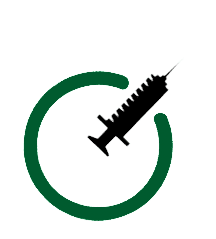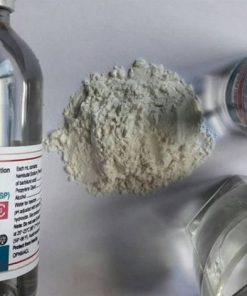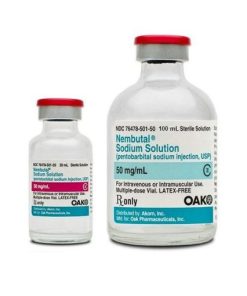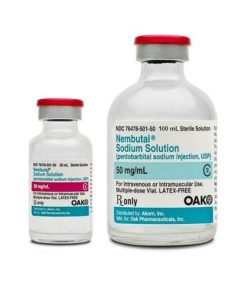Nembutal (sodium pentobarbital) is a barbiturate medication that acts as a central nervous system depressant. It belongs to a class of drugs that slow down brain activity by enhancing the effects of GABA, a neurotransmitter that has calming effects.
Historically, pentobarbital was used medically for several purposes:
- As a sedative and hypnotic for treating insomnia
- For anaesthesia induction
- As an anticonvulsant for certain types of seizures
- In intensive care settings to reduce brain activity and intracranial pressure
However, its medical use has largely been replaced by safer alternatives like benzodiazepines and newer sleep medications, which have lower risks of overdose and dependence.
Today, pentobarbital is primarily used:
- In veterinary medicine for animal euthanasia
- In some jurisdictions for capital punishment
- Rarely in medical settings for specific conditions like refractory status epilepticus
The drug is highly regulated due to its potential for abuse, dependence, and lethal overdose. It’s classified as a controlled substance in most countries. Barbiturates like pentobarbital have a narrow therapeutic window, meaning the difference between an effective dose and a dangerous dose is relatively small.
Nembutal is the brand name for pentobarbital sodium, a short-acting barbiturate sedative–hypnotic used primarily to treat insomnia, relieve anxiety, induce sleep for surgery, manage seizures (especially status epilepticus), and for veterinary euthanasia or certain assisted dying protocols (rxlist.com, en.wikipedia.org).
It depresses the central nervous system by enhancing GABA neurotransmission. When administered intravenously, effects appear almost immediately; orally, onset is usually within 15–30 minutes.
- Approved uses: short-term insomnia relief, pre-anaesthesia, emergency seizure control (e.g. refractory status epilepticus) (ncbi.nlm.nih.gov).
- Off-label: lowering intracranial pressure after brain injury, Reye’s syndrome. Also used in veterinary euthanasia and some medically assisted suicide/state execution protocols (en.wikipedia.org).
Yes. It’s highly habit‑forming and regulated as Schedule II (or III when combined with other agents in certain countries). Dependence and withdrawal (including seizures, anxiety, and insomnia) are real concerns.
Typical side effects include drowsiness, dizziness, confusion, ataxia (loss of coordination), headache, nausea, vomiting, and a “hangover” effect the next day.
Overdose can slow breathing, reduce heart rate and blood pressure, cause coma and stupor, and be life‑threatening. Overdoses often require immediate emergency interventions such as intubation, CPR, activated charcoal, and adrenaline administration (en.wikipedia.org).
Extremely dangerous; combining multiple depressants significantly increases sedation and respiratory depression, with a risk of coma or death.
Yes. Due to shortages of alternative barbiturates, many U.S. states and federal authorities use large doses of pentobarbital for lethal injection. It’s also used in some physician‑assisted suicide and euthanasia protocols (en.wikipedia.org).
It has a half‑life of around 11.5 hours. In lethal or high-dose protocols, the drug accumulates in body fat, prolonging its action (en.wikipedia.org).
Unfortunately, yes. People have obtained pentobarbital illicitly—even for suicide. Black market sales have led to tragic cases of overdose deaths. Some distribute it illegally for euthanasia or self-harm.
Pentobarbital works by depressing the central nervous system. It enhances the activity of GABA (gamma-aminobutyric acid), a neurotransmitter that calms brain activity, leading to sedation, hypnosis (sleep), and in higher doses, coma or death.
Pentobarbital is a short-acting barbiturate sedative. It is used medically to treat insomnia, control seizures, induce coma in cases of brain injury, and as an anaesthetic. It is also used in veterinary medicine for euthanasia and, in some countries, for assisted dying.
Pentobarbital is used to:
-
Induce sleep or sedation before surgery
-
Control status epilepticus (severe seizures)
-
Reduce intracranial pressure
-
Euthanise animals
-
Assist in medically authorised human euthanasia or execution
Pentobarbital is a controlled substance and is not legally available for public purchase. Only licensed veterinarians may obtain and use it, typically for the euthanasia of animals under strict regulation.
During euthanasia, pentobarbital is injected in a high dose, usually intravenously. It causes rapid unconsciousness, followed by deep anaesthesia, cessation of breathing, and cardiac arrest. The process is painless and typically takes less than a few minutes.
Pentobarbital for dogs can only be obtained through a licensed veterinary professional. It is illegal to purchase it online or from unauthorised sources for home use or without a prescription.
As with dogs, pentobarbital for cats is strictly regulated. It must be administered by a veterinarian or obtained under legal veterinary prescription, usually in clinical settings for humane euthanasia.
You cannot legally buy pentobarbital for your dog without a veterinary license. If euthanasia is required, consult your vet. They are authorised to use pentobarbital legally and humanely.
In dogs, pentobarbital is primarily used for:
-
Euthanasia (compassionate end-of-life care)
-
Emergency control of seizures
-
Occasionally for anaesthesia in controlled settings
Pentobarbital slows down brain activity by enhancing inhibitory signals in the nervous system. This results in sedation, sleep, and in large doses, respiratory and cardiac failure.
In countries where assisted dying is legal, pentobarbital is given in a high oral or intravenous dose. It induces sleep, followed by unconsciousness, then causes the heart and breathing to stop within minutes. It is used under medical supervision and with legal safeguards.
Pentobarbital has a half-life of around 15–50 hours, depending on dosage and individual metabolism. Traces can be detectable in the system for up to 5–7 days, especially in cases of overdose or long-term use.
In dogs, pentobarbital is primarily used for:
-
Euthanasia (compassionate end-of-life care)
-
Emergency control of seizures
-
Occasionally for anaesthesia in controlled settings
Pentobarbital slows down brain activity by enhancing inhibitory signals in the nervous system. This results in sedation, sleep, and in large doses, respiratory and cardiac failure.
In countries where assisted dying is legal, pentobarbital is given in a high oral or intravenous dose. It induces sleep, followed by unconsciousness, then causes the heart and breathing to stop within minutes. It is used under medical supervision and with legal safeguards.
Pentobarbital has a half-life of around 15–50 hours, depending on dosage and individual metabolism. Traces can be detectable in the system for up to 5–7 days, especially in cases of overdose or long-term use.
In lethal injections, 2 to 5 grams of pentobarbital are typically used. This dose is significantly higher than therapeutic levels and is intended to cause death rapidly by stopping respiration and heart function.

 Deutsch
Deutsch Español
Español Français
Français Italiano
Italiano Русский
Русский Nederlands
Nederlands Polski
Polski



